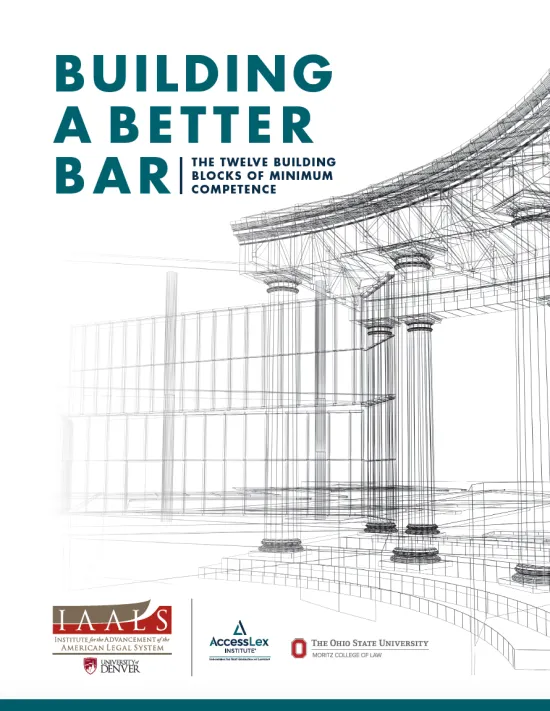Building a Better Bar: Capturing Minimum Competence
Project Status: Advising legal licensure leaders and policymakers

Ensuring better methods to license lawyers
The fairness, efficacy, and validity of the bar exam all depend upon one thing: a clear definition of what minimum competence means when it comes to allowing lawyers to practice law. Only through a clear understanding of what minimum competence is can we treat test takers fairly, serve clients effectively, promote diversity, and improve access to justice. Yet, the bar exam continues to be administered to incoming lawyers without taking into account the minimum competence they should possess upon entering the profession. The Building a Better Bar project has now contributed that critical missing piece—a fair, evidence-based definition of minimum competence—which must now be used to improve the lawyer licensing process.
-
50
focus groups in 12 states around the country to gather insights from new lawyers and their supervisors
-
1 st
ever comprehensive definition of minimum competence to practice law
-
5
insights about what appropriate, accurate assessment of lawyer minimum competence should entail
-
10
recommendations that courts, law schools, bar associations, bar examiners, and others should consider to create better, evidence-based lawyer licensing
Objectives
- Develop and promote understanding of the minimum competence needed to practice law.
- Align the bar exam with research-based concepts of minimum competence.
In partnership with:

AccessLex Institute generously provided funding to make this project possible.
The legal profession has never had a clear, explicit understanding of the minimum competence needed to practice law and how it should be tested on the bar exam (or through other licensing approaches). Without this understanding, it is impossible to know if the bar exam is a valid measure for licensing new lawyers or an artificial barrier to entering the legal profession. However, through the Building a Better Bar project, we have defined minimum competence and have new recommendations for how the legal licensing process—including the bar exam—must change to better serve the public.
Our findings
IAALS, in partnership with Professor Deborah Merritt at The Ohio State University Moritz College of Law, conducted 50 focus groups in 12 states around the country to gather insights into what minimum competence lawyers need when they begin to practice law—based on the knowledge, skills, and judgment needed to serve clients. These focus groups included primarily new lawyers, but also included supervisors of those lawyers. Some specialized groups of new lawyers were comprised of only women, people of color, rural lawyers, or solo practitioners to ensure we gathered a well-rounded view of new lawyers’ experiences.
Findings and recommendations from the study were published in October 2020 in Building a Better Bar: The Twelve Building Blocks of Minimum Competence.
12 Building Blocks
Based on our first-of-its-kind qualitative research, and supported by past quantitative research, it is clear that minimum competence consists of 12 interlocking components—or “building blocks.”
- The ability to act professionally and in accordance with the rules of professional conduct
- An understanding of legal processes and sources of law
- An understanding of threshold concepts in many subjects
- The ability to interpret legal materials
- The ability to interact effectively with clients
- The ability to identify legal issues
- The ability to conduct research
- The ability to communicate as a lawyer
- The ability to see the “big picture” of client matters
- The ability to manage a law-related workload responsibly
- The ability to cope with the stresses of legal practice
- The ability to pursue self-directed learning
IAALS' work on minimum competence and research related to the skills and knowledge new lawyers need has been instrumental as Minnesota moves forward with developing additional models to assess attorney competence.
— Emily Eschweiler
Director, Minnesota Board of Law Examiners
10 Recommendations
Based on our findings, we propose 10 recommendations that courts, law schools, bar associations, bar examiners, and other stakeholders should consider in their efforts to move towards better, evidence-based lawyer licensing.
- Recommendation One: Written exams are not well suited to assessing all aspects of minimum competence. Where written exams are used, they should be complemented by other forms of assessment.
- Recommendation Two: Multiple choice exams should be used sparingly, if at all.
- Recommendation Three: Eliminate essay questions from written exams and substitute more performance tests.
- Recommendation Four: If jurisdictions retain essay and/or multiple choice questions, those questions should be open book.
- Recommendation Five: Where written exams are used, provide more time for all components.
- Recommendation Six: Candidates for licensure should be required to complete coursework that develops their ability to interact effectively with clients.
- Recommendation Seven: Candidates for licensure should be required to complete coursework that develops their ability to negotiate.
- Recommendation Eight: Candidates for licensure should be required to complete coursework that focuses on the lawyer’s responsibility to promote and protect the quality of justice.
- Recommendation Nine: Candidates for licensure should be required to complete closely supervised clinical and/or externship work.
- Recommendation Ten: A standing working group made up of legal educators, judges, practitioners, law students, and clients should be formed to review the 12 building blocks and design an evidence-based licensing system that is valid, reliable, and fair to all candidates.
5 Insights
The data also led us to five insights about appropriate, accurate assessment of minimum competence:
- Closed-book exams offer a poor measure of minimum competence to practice law;
- Time constraints on exams similarly distort assessment of minimum competence;
- Multiple choice questions bear little resemblance to the cognitive skills lawyers use;
- Written performance tests, in contrast, resemble many of the tasks that new lawyers perform; and
- Practice-based assessments, such as ones based on clinical performance, offer promising avenues for evaluating minimum competence.
The legal profession prides itself on its integrity. But if we are to meet our own expectations—and those of the public—we must adopt an evidence-based definition of minimum competence and then use it to shape the lawyer licensing system. We must rethink the bar exam and we must consider how legal education can play a role in the licensing process. Our research and recommendations provide the critical first step on this path.
— Logan Cornett
IAALS project lead and Director of Research
Read our comment in support of the Alternatives to the Exam Task Force’s Recommendations in Oregon, which cites to our study and recommendations.
Project News & Updates
Project Team
Connect & Get Involved
Our work is only possible through purposeful listening and collaboration with people across the country. Everyone, from legal system stakeholders to members of the public, plays a critical role in our innovations. Together, we jumpstart the groundbreaking and achievable solutions that will clear a path to justice for everyone.



